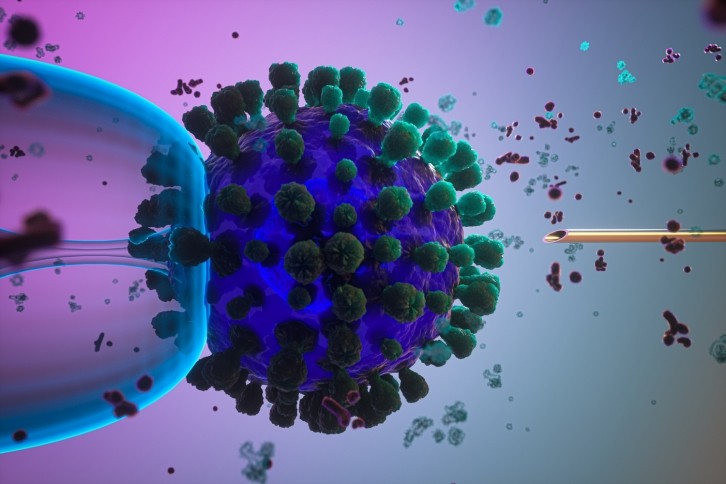The top 5 ADC startups favoured by venture capital investors

ADCs consist of antibodies that are chemically conjugated to a chemotherapy payload molecule via a so-called “linker”. The compounds are designed to guide the chemotherapy to tumor cell targets more selectively and with fewer side effects than traditional chemotherapy.
While ADCs are still emerging as a tool against cancer, they have gained traction fast over the past decades. There are eleven ADCs approved by the US Food and Drug Administration (FDA) with over 100 more in clinical testing. Meanwhile, the global market for ADCs was valued at $9.7 billion in 2023 and is expected to hit $19.8 billion by 2028, according to a report by MarketsandMarkets.
Many investors and large life sciences players have been throwing their cash at companies developing ADCs this year. Some big examples include a $5.5 billion collaboration deal between Merck and Daiichi Sankyo, the $43 billion takeover of Seagen by Pfizer, the acquisition of Seagen by AbbVie, and Samsung Ventures’ investment in Araris Biotech.
Venture capital investors have also been active in financing companies innovating in the ADC space with impressive funding rounds this year. Here are five of the ADC startups that have raised the biggest cash from investors.
Adcendo
Headquarters: Copenhagen, Denmark
Founded: 2017
Adcendo began its life as a spinout from the University of Copenhagen and Rigshospitalet based on preclinical research by its scientific founders on a potential ADC target known as uPARAP. The company was then accepted into BioInnovation Institute (BII)’s Creation House Program in 2019 to accelerate the company’s development.
The target uPARAP is a collagen receptor that leads cells to recycle collagen fragments from outside the cell. The protein is also overexpressed in a number of solid tumors including soft-tissue sarcoma, osteosarcoma, mesothelioma and glioblastoma multiforme (GBM). This, combined with its ability to rapidly allow ADCs to enter cancer cells, makes uPARAP an appealing ADC target for Adcendo.
Adcendo first drew the attention of investors in 2021 when it bagged €51 million ($55.9 million) in a Series round led by Novo Seeds and Ysios Capital. It topped up the round in April with the addition of €31 million ($34 million) in a round led by Pontifax Venture Capital, Novo Holdings and Ysios.
Adcendo is also developing candidate drugs against different cancer ADC targets in tandem with other companies including Duality Biologics and Glytherix.
Adcentrx Therapeutics
Headquarters: San Diego, California, US and Shanghai, China
Founded: 2021
Adcentrx stormed onto the ADC scene when it raised a $50 million Series A round led by CBC Group in 2021. The startup continued to attract investors in April this year when it raised $38 million in a Series A+ round led by Eight Roads Ventures and an extension round of $13 million in December.
The startup is using the proceeds to develop a pipeline of ADC candidates that are designed to overcome common obstacles in the technology. For example, the company is designing its ADCs to have more stable conjugation than current drugs to increase how much drug is delivered to the target. Additionally, Adcentrx uses payloads and linkers to tackle tumors where not all cells express the ADC target.
Adcentrx’s lead candidate, which targets Nectin-4, is in a phase 1a/b trial for the treatment of advanced solid tumors , with an initial readout in mid-2024. The firm is also working on other candidates at the preclinical stage.
Alentis Therapeutics
Headquarters: Basel, Switzerland
Founded: 2019
Alentis researches cancer therapies that target a protein called claudin-1 (CLDN1), a protein that normally sits hidden in tight junctions between cells. In some types of cancer cells, however, CLDN1 can be found outside of tight junctions and vulnerable to targeted drugs.
The company was set up based on CLDN1 research carried out at the University of Strasbourg and the French National Institute of Health (Inserm). It went on to raise big funding rounds including a $67 million Series B funding in June 2021 and an impressive $105 million Series C funding round in April this year led by Jeito Capital, Novo Holdings A/S and RA Capital Management.
While Alentis’ most advanced oncology programs are monoclonal antibodies, the company also has an ADC program in preclinical development and similar programs pending, according to the company website.
MBrace Therapeutics
Headquarters: San Diego, California, US
Founded: 2020
MBrace was founded to develop ADCs based on a technology platform called SPARTA, which was developed at Rutgers New Jersey Medical School.
The platform is designed to develop candidates against novel ADC targets so that the drug technology can be used against tumors currently lacking existing therapies and those that have become resistant to previous treatments. MBrace has also developed a way to manufacture antibodies against intracellular targets that are less harmful to manufacturing cells than current approaches.
The company’s lead candidate ADC is in a phase 1 trial for the treatment of advanced metastatic solid tumors that have ceased to respond to standard treatment. It is designed to block the target EphA5 – a protein that is found more often in tumor cells than in normal cells. EphA5 is also thought to readily internalize ADCs into cancer cells so that the drug can kill them from the inside.
To finance the development of its pipeline, MBrace raised $85 Million in a Series B round led by TPG with participation from Avidity Partners and Cowen Healthcare Investments.
Tagworks Pharmaceuticals
Headquarters: Nijmegen, the Netherlands
Founded: 2011
Tagworks originated as a spin-out from Philips Healthcare and uses a so-called Click-to-Release approach to develop ADC compounds.
Classical ADCs typically require internalization in a tumor cell, where the payload can be cleaved by proteases in the cell, limiting the number of targets available for ADCs. In contrast, Tagworks can design ADCs against non-internalizing cancer targets. This is because its ADCs have a special type of linker that releases its anticancer payload only when a molecule called tetrazine is administered to a patient separately, according to Tagworks’ website.
Investors showed their interest in Tagworks in June this year when the company raised $65 Million in a Series A round led by Ysios Capital and Gilde Healthcare.
The company is using the funding to propel the development of its preclinical-stage lead candidate ADC, which is designed to seek out the pan-carcinoma target TAG72.
Tagworks is also using its technology to develop better radioimmunotherapies. Normally, radiolabeled antibodies that don’t bind to cancer cells remain in the blood for a long time, increasing the radiation dose that healthy tissue receives and making it harder to dose safely. Using Tagworks’ strategy, however, radiolabeled antibodies can be broken up and removed more quickly, increasing the dose that can be safely administered.
















